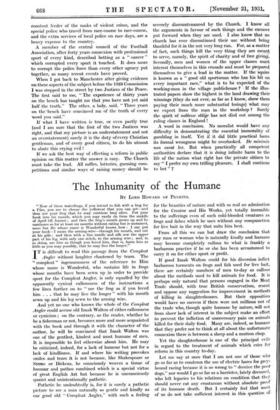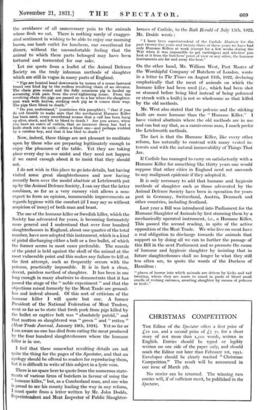The Inhumanity of the Humane
BY LORD HOWARD OF PENRITII.
" Now of these waterfrogs, if you intend to fish with a frog for a Pike, you are to choose the yellowest that you can get—and thus use your frog that he may continue long alive. Put your hook into his mouth, which you may easily do from the middle of April till August ; and then the frog's mouth grows up and ho continues so for at least six months without eating but is sustained, none but He whose name is Wonderful knows how ; I say put your hook—I mean the arming-wire—through his mouth, and out at his gills ; and then with a fine needle and silk sew the upper part of his leg, with only one stitch, to the arming wire ; and, in so doing, use him as though you loved him, that is, harm him as little as you may possibly, that he may live the longer."
IT is difficult to read this passage from the Compleat Angler without laughter chastened by tears. The " compleat " ingenuousness of the reference to Him whose name is Wonderful, who sustains life in frogs whose mouths have been sewn up in order to provide sport for the Compleat Angler, is only equalled by the apparently cynical callousness of the instructions a few lines further on to " use the frog as if you loved him . . . that he may live the longer " with his mouth sewn up and his leg sewn to the arming wire.
And yet no one who knows the whole of the Compleat Angler could accuse old Izaak Walton of either callousness or cynicism ; on the contrary, as the reader, whether he be a fisherman or not, becomes more and more acquainted with the book and through it with the character of the' author, he will be convinced that Izaak Walton was one of the gentlest, kindest and most humane of men. It is impossible to feel otherwise about him. He may be criticized, indeed, for a lack of humour but not for a lack of kindliness. If and where his writing provokes smiles and tears it is not because, like Shakespeare or Sterne or Dickens, he consciously weaves a tissue of humour and pathos combined which is a special virtue of great English Art but because he is unconsciously quaint and unintentionally pathetic.
Pathetic he undoubtedly is, for it is surely a pathetic picture to see a man naturally so gentle and kindly as our good old " Compleat Angler," with such a feeling for the beauties of nature and with so real an admiration for the Creator and His Works, yet totally insensible to the sufferings even of such cold-blooded creatures as• frogs and fishes which he uses without any compunction for live bait in the way that suits him best.
From all this we can but draw the conclusion that any man or woman who is naturally kindly and humane may become completely callous to what is frankly a barbarous practice if he or she has been accustomed to carry it on for either sport or profit.
If good Izaak Walton could for his diversion inflict barbarous torments on frogs and fish used for live bait, there are certainly numbers of men to-day as callous about the methods used to kill animals for food. It is perhaps only natural that persons engaged in the Meat Trade should, with true British conservatism, resent and oppose any suggestion for improvement in methods of killing in slaughterhouses. But their opposition would have no success if there were not millions not of the trade who, though quite humane by nature, will not from sheer lack of interest in the subject make an effort to prevent the infliction of unnecessary pain on animals killed for their daily food. Many are, indeed, so humane that they prefer not to think at all about the unfortunate connexion there is between a sheep and a mutton chop.
Yet the slaughterhouse is one of the principal evils in regard to the treatment of animals which cries for reform in this country to-day.
Let me say at once that I am not one of those who go so far as to condemn the use of electric hares for grey- hound racing because it is so wrong to " deceive the poor dogs," nor would I go so far as a barrister, lately deceased, who left legacies to his relations on condition that they should never eat any crustacean without absolute proof of its humane death. But I certainly feel that most of us do not take sufficient interest in this question of• the avoidance of all unnecessary pain to the animals whose flesh we eat. There is nothing surely of exagger- ated sentiment in wishing to be able to enjoy our morning bacon, our lamb cutlet for luncheon, our sweetbread for dinner, without the uncomfortable feeling that the animal to which these parts belonged may have been tortured and tormented for our sake.
Let me quote from a leaflet of the Animal Defence §ociety on the truly inhuman methods of slaughter which are still in vogue in many parts of England. .
" Pigs are hoisted head downwards by means of a noose fastened mound one hind leg to the endless revolving chain of an elevator. The chain goes round and the fully conscious pig is hauled .up screaming, with pain from the ever-tightening noose. From the revolving chain the pigs are passed on to a bar where the slaughter= men wait with knives, sticking each pig as it comes their way. The pigs then bleed to death.' " Do you understand," (continues this pamphlet), " that if you do not trouble to make sure that the mechanical Humane Killer has been.used, every sweetbread means that a calf has been hung up alive, stuck, and left to bleed to death ? Are you aware, when you have an entree of cutlets, that an innocent sheep has had a knife stuck into its neckoften_a blunt one--and 'perhaps wielded by a careless boy, and that it has bled to. death ? '
Now, .indeed, these things are not pleasant to meditate upon by those who are preparing legitimately enough to enjoy . the pleasures of the table. Yet they are taking place every-day in our midst and they need not happen if we cared enough about it to insist that they should not. .
I do not wish in this place to go into details, but having visited some great slaughterhouses and now having recently been over the model abattoir at Letchworth put up by the Animal Defence Society, I can say that the latter combines, so far as a very cursory visit allows a non- expert to form an opinion, innumerable improvements as regards hygiene with the comfort (if I may say so without suspicion of irony) of both man and beast.
The use of the humane killer or Swedish killer, which the Society has advocated for years, is becoming fortunately more general and I understand that over four hundred slaughterhouses in England, about one quarter of the total number, have now adopted this instrument, which is a kind of pistol discharging either a bolt or a free bullet, of which the former seems in most cases preferable. The muzzle of the pistol is held against the skull of the animal at the most vulnerable point and this makes any failure to kill at the first attempt, such as frequently occurs with the poleaxe, practically impossible. It is in fact a clean, decent, painless method of slaughter. It has been in use long enough in many abattoirs to demonstrate that it has passed the stage of the " noble experiment " and that the objections raised formerly by the Meat Trade are ground- less and indeed- absurd. Of this sort of criticism of the humane killer I will quote but one. A former President of the National Federation of Meat Traders, went so far as to state that fresh pork from pigs killed by the bullet or captive bolt was " absolutely putrid," and that mutton so slaughtered was " green " and " rotten " (Meat Trade Journal, January 24th, 1924). Yet so far as I am aware no one has died from eating the meat produced by the four• hundred slaughterhouses where the humane killer is -in use.
I feel that these somewhat revolting details are not quite the thing for the pages of the Spectator, and that an apology should be offered to readers for reproducing them, but it is difficult to write of this subject in a lyric vein.
There is no space here to quote from the numerous state- ments of various firms of butchers in favour of using the " humane killer," but, as a Cumberland man, and one who is proud to see his County leading the way in any reform, I must quote from a letter written by Mr. John Dodds, Superintendent and Meat Inspector of Public Slaughter- houses of Carlisle, to the Bath Herald of July 15th, 1922. , Mr. Dodds wrote " I have been superintendent of the Carlisle Abattoir for the,- past twenty-five years and twenty-three of those years we have had only Humane Killers at work (except for a few weeks during the War when it was impossible to get cartridges) and whether you look at it from the butchers' point of view or any other, the humane instruments are far and away the best."
On the other hand, Mr. William West, Past Master of the Worshipful Company of Butchers of London, wrote In a letter to The Times on August 11th, 1922, declaring emphatically that the meat of animals on which the humane killer had been used (i.e., which had been shot or stunned before being bled instead of being poleaxed or struck with a knife) is not so wholesome as that killed by the old methods.
Mr. West also stated that the poleaxe and the sticking knife are more humane- than the " Humane Killer." I have visited abattoirs where the old methods are in use and can but say that, as a carnivorous man, I much prefer the Letchworth methods.
The fact is that the Humane Killer, like every other reform, has naturally to contend with many vested in- terests and with the natural immovability of Things That Are.
If Carlisle has managed to carry on satisfactorily with a Humane Killer for something like thirty years one would suppose that other cities in England need not succumb to any malignant epidemic if they adopted it.
It is only necessary to add that humane and hygienic methods of slaughter such as those advocated by the Animal Defence Society have been in operation for years past in Germany, Switzerland, Austria, Denmark and other countries, including Scotland.
Last year a Bill was introduced into Parliament for the Humane Slaughter of Animals by first stunning them by a mechanically operated instrument, i.e., a Humane Killer. This passed the second reading, in spite of the active opposition of the Meat Trade. We who live on meat have a real obligation to discharge towards the animals that support us by doing all we can to further the passage of this Bill in the next Parliament and so promote the cause of humane and hygienic slaughter by insisting that in future slaughterhouses shall no longer be what they still too often are, to quote the words of the Duchess of Hamilton :
" places of horror into which animals are driven by kicks and tail twisting, where they are made to stand in pools of blood runid smells of reeking carcases, awaiting slaughter by means of poleaxe or knife."

































































 Previous page
Previous page